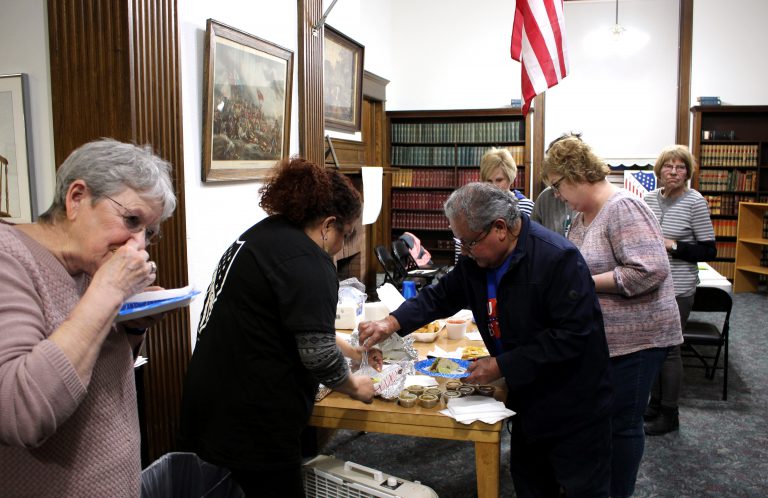On a Monday night, a week before the Iowa caucuses, about 20 residents gathered at the Norelius library in Denison, Iowa, for a mock caucus. Latina activist Alma Puga, the organizer, called the caucuses the “Disneyland of politics.”
Producer Andrea Tudhope of America Amplified: Election 2020 spent time in Denison, Iowa, where immigrants make up at least a third of the local population, to get a sense of how they feel about immigration in the U.S.
Rather than caucusing for candidates, it’s food: egg rolls, pepperoni pizza, homemade ceviche and carne asada tacos — a multicultural spread reflecting a diverse town here in rural Iowa.
Of around 9,000 residents in Denison, at least 3,000 — or about 30% — are immigrants, according to the latest Census Bureau data. By comparison, the U.S. average is 13% and it’s 5% in the state of Iowa.
Denison is a town of about 7 square miles.
“When you grow up in a predominantly white community, that’s what you’re used to with very few minorities. And when you have an influx, it changes everything,” said Troy Gehlsen.
Gehlsen grew up in the 1980s, around the time the population began to shift.
“It’s gotten a lot easier, but it should — it’s been three decades at least,” he said.
A new survey fielded in collaboration with APM Research Lab suggests this sense of acceptance may have to do with proximity.
“If you have more immigrants in the county in which you live, you’re much more likely to feel positively about welcoming immigrants on a national policy level,” said Craig Helmstetter, managing partner of APM Research Lab.

Helmstetter directed the survey, which asked Americans how they feel about the numbers of immigrants in this country — 41% said they feel the U.S. has the “right amount,” 26% felt it should allow more, and close behind, 25% said the country allows too many.
As caucus and primary season launches, I spent time with some residents of Denison, Iowa, to get a sense of how they feel about immigration in the U.S.
Here are some of the people I met and what they had to say.
Alma Puga
The young activist was born in Mexico, and came to Denison when she was five because her parents heard from friends there were jobs in town. Now she wants to grow roots here, and is focused on getting the local immigrant communities politically engaged.
Troy Gehlsen
Growing up in the 1980s, Gehlsen remembers about a dozen minority families in town. Now, over half the students in Denison’s schools are learning English as a second language, according to Iowa Public Radio.
Chris Espino

Espino is a senior at Denison Community High School. He was born here, but because his parents came from Mexico, he says he’s experienced discrimination. He used to wonder what he was doing wrong, but then, he says, he realized it wasn’t his fault.
Bryan Bryant
Bryant comes from a military family, so he has lived all over the world. He’s been in Denison for about a decade caring for his elderly parents and keeping his mom’s coffee shop, the Robin’s Nest, open. He says he appreciates immigrants coming to this country legally, but he worries about the loss of American culture and small town Iowa values.

Brett Gehlsen
Gehlsen co-owns Reynold’s Clothing on Main Street with his brother Troy Gehlsen. Both agree that immigrants have helped keep their family’s third-generation men’s clothing store alive.
Patty Ritchie
Ritchie says it’s important to her to maintain her family’s Iowa roots and values, but also to keep her culture close. The Latina community advocate says Denison has come a long way, thanks to the work of an older generation of immigrants.
Andrea Tudhope is coordinating producer for America Amplified: Election 2020. Email her at andreat@kcur.org, and follow her on Twitter @andreatudhope.

9(MDM5MjE5NTg1MDE1Mjk1MTM5NjlkMzI1ZQ000))

